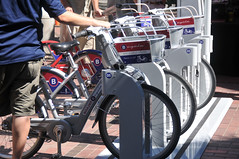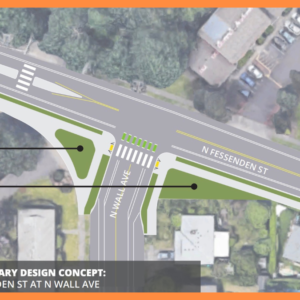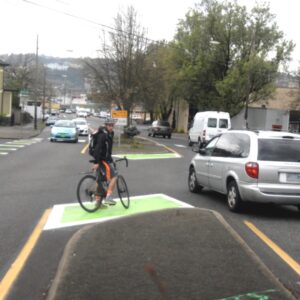This guest post is by Michael Andersen of Portland Afoot, a 10-minute newsmagazine and wiki for public transit riders in Portland.
—
If bike sharing comes to Portland as expected, it won’t really be for cycling devotees, many of whom already take their bicycles everywhere.
No, bike sharing will be for people who rode in on buses, trains, planes or automobiles. That’s what makes it so interesting, especially to transit people like me. That’s also why the price for using Portland’s future bike sharing system is going to be very, very important.
Nobody cares more about price than a newbie.
So let’s look forward to fall 2013. After eight years of debate, Zipcar-style bike sharing has finally arrived in Portland and you’re standing in front of a kiosk offering bikes for checkout. Maybe they’re the big, 49-pound Bixis, the type Jonathan said he preferred riding in a post last week. How much will you be paying to pull that first bike off its station?
Based on the six major bike sharing systems in the U.S. and Canada — Denver, Montreal, Toronto, Washington D.C., Minneapolis and Boston — you’re likely to be coughing up about $5 a day (the same as a TriMet daypass) or about $75 a year, plus another $1.50 for each ride that lasts between 30 and 60 minutes.
For longer trips, costs will stack up faster. But if you’re a regular who knows the system, you’ll rarely ride for longer than 30 minutes, let alone 60.
This price scheme is far from certain, and the Portland Bureau of Transportation couldn’t be reached for comment on this story. But every major municipal system in both countries has so far followed the same pattern: a “membership” or “subscription” fee that can be bought by the day, week, month or year, plus a “trip” fee based on the trip’s duration. In all such systems, the first 30 minutes are free.
Among the big six, the lowest annual fee is in Minneapolis, at $60, but most of the system’s 3,700 memberships were sold during the spring sale, when they went for $40 each, Nice Ride Minnesota Executive Director Bill Dossett said Monday. The Twin Cities’ system is open only from April to November. Other bikeshare prices (note that these days, Canadian dollars are basically equivalent to U.S. dollars):
- Denver (March-November): $65 a year
- Washington D.C. (year-round): $75 a year
- Montreal (April-November): $78 Canadian a year
- Boston (March to November): $85 a year
- Toronto (year-round): $95 Canadian a year
What about those per-trip fees? Dossett said regular bike-share users almost never take trips of more than 30 minutes. If Portland’s future system offers the first half-hour free, as do most other modern systems, it’s hard to imagine things being much different in Portland.
Portland has promised to do bikesharing a bit differently than other cities have, and things could wind up differently here. Guadalajara, Mexico, for example, charges just $15 a year for membership and relies on local businesses to sponsor each new bike station — you can read local bike entrepreneur Ryan Hashagan’s description of that system or listen to Lillian Karabaic’s analysis on the next episode of Portland Afoot’s new commuting podcast.
As a guy who goes almost everywhere by carrying his bicycle on TriMet, I don’t think I’d personally use bike sharing enough to make it worth more than $40 a year — though I’d be less likely to carry my bike on the MAX if my annual TriMet pass came with a bike share membership. But what about you?
And more importantly, what about your non-biking friends?
The September cover story of Portland Afoot profiles Don Baack, a Southwest Portland retiree who builds urban trails where the government won’t. BikePortland readers can subscribe for $10 a year with discount code BIKEPORTLAND.








Thanks for reading.
BikePortland has served this community with independent community journalism since 2005. We rely on subscriptions from readers like you to survive. Your financial support is vital in keeping this valuable resource alive and well.
Please subscribe today to strengthen and expand our work.
Excellent article as always, Michael! I’d like to add the CaBi in DC partnered with Groupon in March and offered the $75 ticket for only $37, and if I recall correctly, nearly a thousand extra people signed up on that day.
I really like the idea of a joint trimet pass; perhaps a $7 day pass would let you use both trimet and bikeshare? or a yearly trimet pass would come with free bikeshare for the first month?
Correction: membership DOUBLED to nearly 10,000. I’m assuming that means ~5000 took up the offer.
source: WAMU
http://wamu.org/news/11/04/21/popular_bikeshare_program_expands_in_dc.php
Great article. I really hope that trimet combines their pass, bikeshare, and those locker things they have. That’s an integrated mass transit system I could get behind. Especially since at current rates by 2013 an all zone month pass will be well north of $100/month. All of a sudden bikeshare looks pretty reasonable. Especially once the free fare zone goes away.
TriMet fare rates are only going to go up, not down…
All of the MAX lines are pretty much “free” fare zones unless you are principled or hop on at the wrong time of day…
regrettably, this is true.
This is a whole other issue, but fare evasion is NOT as big of a problem as people assume. So insignificant that enforcement is a net-loss
Much less so than it was two months ago, though:
http://www.katu.com/news/local/129432258.html
I’d be happy to pay $75/year.
It needs to be self-sufficient after the start up cost.
not to mention that this is a no-brainer product to integrate into every higher ed’s flexpass program: PCC, Concordia, PSU, OHSU, and etc. et al.
there’s such potential for high, bulk uptake in these markets that it wouldn’t surprise me if the rate structure were lower than elsewhere.
Totally, David. Extrapolation based on college students’ use of bikesharing in other cities would be worth a post of its own.
If I lived in Gresham or Beaverton and had to commute in to Portland, it would be well worth $75 a year to not have to deal with trying to weasel my bike onto a crowded rush-hour MAX train every day, and cheaper/more practical than buying a second bike to leave locked up downtown.
And yet, we have people on this blog that complain about bike sharing funding in one breath, and not having enough bike parking on Trimet in another.
This is exactly why we need bike sharing.
+1. And after the program is (hopefully) successful, in ten years it might be just as easy to hop on a max downtown and take bikeshare for that last-mile in beaverton, gresham or milwaukie (or maybe even vancouver!)
There aren’t many casual riders who are going to be capable of riding a 49 pound bike from Beaverton to downtown.
That’s why they would take MAX to Beaverton to pick up a bikeshare bike from a kiosk. I can picture them being in place at Beaverton TC, for example.
Why does it need to be self-sufficient after start up?
Mass transit is already heavily subsidized, as are the roads motorists use, and there’s no reason the bike share system should be any different.
Remember only bikes are supposed to “pay their way” 😉 [joking]. I am anything but a libertarian (especially after seeing video of the cheering of the death of the hypothetical uninsured man last night) but if bikesharing can be self-sufficient lets make it be self-sufficient. It isnt much of a stretch in the bike share business model to have it cover its costs (its apparently pretty close now) and the potential prices are very reasonable (say $5/day, $75/year). It would also help big time with perception of bikes paying their way, its all about perception of paying one’s way not whether one actually does (i.e. autopia).
I would love for transit to be self-sufficient too, but it cant anymore (thanks to competition of free high-speed extensive wide roads) and going from 20% farebox recovery to 100+% is way too big of a gap. And obviously I would really like roads to cover their costs which clearly they dont. If you took the subsidy away from driving, it would allow transit to cover its costs (as it did in the past before extensive roads), it just cant when it has to be cheaper than driving (because its already slower). Plus taking the subsidy away from driving would attract a lot more riders, providing more packed vehicles. It would also mean fewer cars on the road and therefore better conditions for cycling (and without having to build bike infrastructure (as great as it is) which is reakky only needed to protect cyclists from the negative impacts of cars in the first place).
Man, as a Portlander currently living in Minneapolis I think the $60 per year I spend on Nice Ride is a super value and if Portland can get bike sharing for that price or less I will be one happy camper when I come home. As for trip fees here in Minneapolis it is easy to avoid by riding station to station even if the trip is longer than 30 minutes total.
Besides the North American model of ~$75 annual fees, plus extra funding from advertizing or sponsors, there is the Hangzhou model.
This Chinese city of 2 million (with 8 million in the prefecture) has the largest bike share in the world, with 2000 stations and 50,000 bikes. Bike rides are free with a transit pass, for rides under 1 hour. Both bikes and buses are paid for with electronic transit cards (like the Oyster card in London or the Orca in Seattle).
Portland could integrate the bikes with the transit system as well, but you really need an electronic system to make it work with a modern bike share system. Is Trimet considering going to smart cards instead of paper passes?
http://www.streetfilms.org/the-biggest-baddest-bike-share-in-the-world-hangzhou-china/
If trimet wants bikes off their buses and trains as badly as they seem to it is a no brainer for them to offer free access to the bike share to anyone who buys a monthly or annual pass.
Why do you think they “want bikes off their buses and trains”? They have a page informing riders how to bring their bikes on board:
http://www.trimet.org/howtoride/bikes/index.htm
Seems like they wouldn’t have installed all of those bike racks on the buses and MAX, if what you say is true.
I think that those two truths can exist simultaneously: Trimet can find it annoying to have to deal with bikes taking up time/space, while also deciding that if someone’s gonna put a bike on their vehicle, they might as well do it correctly and quickly.
Excellent point, Natalie! Somebody should hire you to write about this stuff.
Bike share membership has benefits, even for bicycle obsessive people like me. Had I not known I was moving, I would’ve been a member of the Minneapolis Nice Ride program this year.
It’s nice for those occasions where the bike could be a liability for part of the trip. You probably shouldn’t ride BACK from a bar crawl. What if there’s too much stuff to carry back from the store/market on your bike? Maybe you took transit to work, but it’s a beautiful afternoon.
The point is that one way or another, you’ll get the money back, whether you spend less on transit or cabs, save wear/risk on your bike, or just get more fun out of riding.
Sounds great but think about the logistics. You won’t be able to ride a bike share bike to the bar and leave it there unless there’s a station near your house and another one at your destination, and the same goes for the grocery trip.
If the stations are concentrated downtown, as I expect they will be, the only people they will possibly benefit are tourists and perhaps some multimodal downtown commuters, but the logistics of the latter aren’t all that clear, as it seems commuter use would result in diurnal pile-up points for the bikes.
Cities like Boston, Montreal, Toronto and Paris have much larger densely populated downtown areas than Portland and probably much bigger bike share service areas than lower-density Portland will be able to develop.
I wonder if they will take into account that “annual” riders will only realistically be riding less than half the year or just leave that up to the consumer. The racks at my work are empty just because the temps dropped 10 degrees and its cloudy and it not even wet yet.
Really like the idea of a joint Trimet/bike-share pass. Seems like a potential marketing tool that Trimet could use to increase revenue, plus a way to make bike-sharing actually equitable and accessible to those who need low-cost transit.
I’d like to understand how they’re planning to handle the Helmet Problem.
No helmets, no problem
Building bikeshare into the Trimet pass system is a fantastic idea, at least for people who would use bikeshare (myself & Mrs Dibbly included). Everyone else will be subsidizing it. I’m especially pleased because my employer provides me with an annual pass, so it would be free to me. 🙂
Seriously, though, bundling would help get people to try it (“I paid for it with my pass so I might as well give it a go”.) I agree that would help Trimet get bikes off the buses & trains. (Something that they clearly would like to do.) A Trimet pass is good for the streetcar, so why not bikeshare?
With regards to “the Helmet Problem”, I suspect that we’ll see a lot of things like “Portland Bikeshare strongly supports the use of helmets when you use one of the bikes” but nothing else beyond that. The logistics would be incredibly difficult.
Maybe the helmet problem could be handled by drivers in cars not running over or into the people on the bikes.
Oh wouldn’t that be lovely.
I don’t think I’d become an annual member at a price above $35 or so, because (already having a bike, and not usually having problems commuting with it) I can’t see myself using it enough to get the value. I might buy a day pass a handful of times, but a day price of $5 would usually dissuade me from using it to complete/add to a Trimet journey (the only time recently that I’ve been downtown and wished I had a bike to use, but didn’t, was for a side trip from 5th and Jefferson to 13th & Burnside, and I already had a Trimet ticket), unless there was a type of integrated pass as others have suggested.
I’ve seen mentioned the idea that it’s nice to have a membership, even if you don’t use it much, as an amenity for out-of-town visitors. Maybe when it’s all over the city…
The thought of a lot more inexperienced bicyclists riding around downtown – many of them perhaps visiting Portland for the first time – is unnerving and strikes me as a liability gamble much bigger than the party bike thing, which last I heard hasn’t been permitted yet. Portland is not a easy city to ride in and like many other threads on this blog point out, there is much still to be done to improve bicycling infrastructure and safety here.
There is a tendency to support anything “bike” on this blog. Usually I’m for it. But there needs to be more skepticism on this one. It’s seems irresponsible for the city to just throw in a bike share program and then say to the outside world (or suburbs), “Look at us, we’re really bike friendly now! Come to Portland and do bike sharing!” when it’s really not that simple given what the streets here are really like to ride on.
I’d love for PBOT to pair the bike share introduction with some high-quality facilities downtown (Seriously, just convert the transit mall auto lane to bike-only).
That said, people had the same fear in cities all around the country about inexperienced riders using new bike share systems, but no problem has materialized. Bike share riders are slower, and more cautious, and get into fewer accidents than regular bicyclists do.
Data? Not arguing… just wondering if there is any data available.
Also, I just think it’s a little strange that the pub crawl party bike thing has a difficult time getting permitted because of liability concerns but the city is ready to put thousands of random individuals on the streets with a public-private bike share program. If they’re willing to accept the liability of bike share, then it’s only fair that bike related enterprises be permitted too.
How about short-term memberships for out of towners? It would be nice to have access to these bikes when I visit Portland, but probably not worth $60/yr for two or three tirps.
Yeah, this is universally offered, Eric — you’d almost certainly be able to spend $5 for a bikeshare daypass on any of your visits to Portland.
Interestingly, these daypasses accounted for fully half the revenue in the Minneapolis system last year, the executive director told me. With bikesharing, tourists are where the money is.
(This is why they have one in Miami Beach.)
I can imagine times when I’ve taken the train into town and then want to hop on a bike to get say from the pearl to 23rd rather than waiting for the street car.
Or lots of times, when going out in the evening to dinner we take the train into town and like to have a few drinks and take end up taking a taxi home. Would be nice to be able to hop on a bike rather than wait for a bus or street car to get to restaurants and bars not on the Max route.